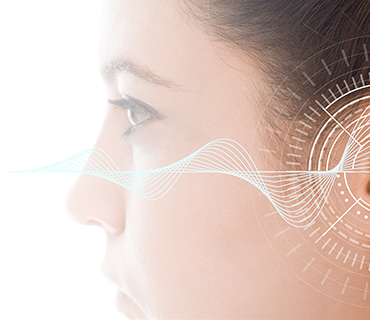HEARING

Hearing Evaluation - what does this include?
What to do beforehand
It is a good idea to make sure that your ear canals are clean before a hearing test. Earwax can affect the results and make them unreliable. It is preferable to have the earwax removed by a specialist or an audiologist that is specially trained to do so. Confirm your appointment and bring any prior hearing tests with so that a prognosis can be formed from all the available information.
What will happen at the first appointment?
The audiologist will do a thorough hearing test consisting of:
- Case History
- Otoscopic Examination
- Tympanometry
- Pure Tone Audiometry
- Speech Audiometry

How do we Hear?
Sound waves are collected by the outer ear and directed along the ear canal to the eardrum (tympanic membrane). The sound waves reach the ear drum and their impact vibrates this membrane, which in turn causes the vibratory motion of the three little bones (Malleus, Incus, Stapes) in the middle ear cavity.
more
Tinnitus
Tinnitus is the perception of sound within the human ear. It is very common and one in five people between 55 and 65 years old report tinnitus.
Tinnitus is not a disease, but a symptom resulting from a range of underlying causes that can include: ear infections, foreign objects or wax in the ear, and nose allergies that prevent fluid drainage and cause wax build-up.

Learn about Hearing Loss
When describing a hearing loss, we generally look at three attributes: type of hearing loss, degree of hearing loss, and the configuration of the hearing loss.
Hearing loss can be categorized by where or what part of the auditory system is damaged. There are three basic types of hearing loss: conductive hearing loss, sensori-neural hearing loss and mixed hearing loss.
If you experience two or more of the following symptoms, you may have a hearing loss and are advised to get your hearing checked by an Audiologist
Consequences of Untreated Hearing Loss
Emotional and Psychological problems: loneliness and frustration can cause depression, anger, sadness, decreased motivation, poor self-esteem, embarrassment of always having to ask for repetition.
Work Disturbances: Cannot hear warning signals when around dangerous machinery; cannot communicate with colleagues which make work performance less productive; struggles to hear and thus doesn’t follow commands, decreased attention and concentration.
Developmental Disturbances: This is seen mainly in children where they struggle to learn speech and language, and learn socially appropriate interactions. This often results in learning problems at school, and further social and emotional problems.
Risk Factors in Hearing Loss
-
Aging
Exposure to sounds over the years can damage the cells of your inner ear.
-
Hereditary
Your genetic makeup may make you more susceptible to ear damage.
-
Occupational Noises
Jobs where loud noise is a regular part of the working environment, such as farming, construction or factory work, can lead to damage inside your ear.
-
Recreational Noises
Exposure to explosive noises, such as from firearms and fireworks, can cause immediate, permanent hearing loss. Other recreational activities with dangerously high noise levels include motorcycling or listening to loud music.
Personal music players such as MP3 players and iPods can cause lasting hearing loss if you turn the volume up high enough to mask the sound of other loud noises, such as a lawn mower. Listening to music daily via earphones in the office can also result in hearing loss – constant and chronic noise. -
Certain Medications
Certain medications can also cause a hearing loss. Sometimes the hearing loss is temporary, but sometimes it is permanent.
Salicylates - such as aspirin in very high dosages taken chronically
Non-Steroidal Anti-inflammatory Agents - such a ibuprofen n very high dosages taken chronically
Quinine - used to treat malaria
Loop Diuretics - when given via IV
Some Chemotherapeutic Agents - specifically Cisplatin and Carboplatin
Aminoglycosides – when given via IV. These drugs are very strong anti-biotic drugs. -
Certain Illnesses
Diseases or illnesses that result in an extremely high fever, such as meningitis, may damage the cochlea
Diabetes
Kidney Disease
HIV/AIDS
Birth complications